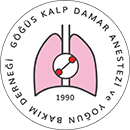

Effect of Emotional Status on Early Morbidity after Coronary Artery Bypass Graft Surgery
Alper Can1, Günseli Abay21Department of Anesthesiology, Datça State Hospital, Muğla, Türkiye2Department of Anesthesiology, Dr. Siyami Ersek Thoracic and Cardiovascular Surgery Training and Research Hospital, İstanbul, Türkiye
Objectives: We investigated whether anxiety and/or depression increased the risk of morbidity in the early postoperative period following coronary artery bypass graft surgery (CABG). Additionally, we evaluated the effects of emotional state on recovery.
Methods: We studied 81 patients undergoing CABG. Their emotional status was measured using the Hospital Anxiety and Depression Scale (HADS), Hamilton Anxiety Rating Scale, and Hamilton Depression Rating Scale on the day before surgery and on day 5 after surgery. Then, we compared the rate of postoperative cardiac, respiratory, neurological, and renal complications between the patients with mild to moderate anxiety and/or depression symptoms with those who showed no emotional distress.
Results: Prior to surgery, 18 patients showed mild to moderate anxiety and/or depression symptoms (emotional disorder group1), while the remainder (group 2, n=63) showed no emotional disorder. There was no significant difference between the preoperative and postoperative periods in both groups for all anxiety and depression test scales except for the HADS anxiety subgroup, where the results in both groups were significantly lower postoperatively than preoperatively. In the group with preoperative emotional distress, the incidence of postoperative atelectasis and pneumonia was higher than in the group with no preoperative emotional distress. Furthermore, the duration of mechanical ventilation, stay in the intensive care unit stay, and overall hospital stay was significantly longer in the emotional disorder group.
Conclusion: Emotional distress is an important risk factor that increases morbidity and delays the recovery period by increasing respiratory complications in the early postoperative period following CABG.
Keywords: Anxiety, coronary artery bypass graft surgery, depression, emotional distress, morbidity
Makale Dili: İngilizce
(685 kere indirildi)

















